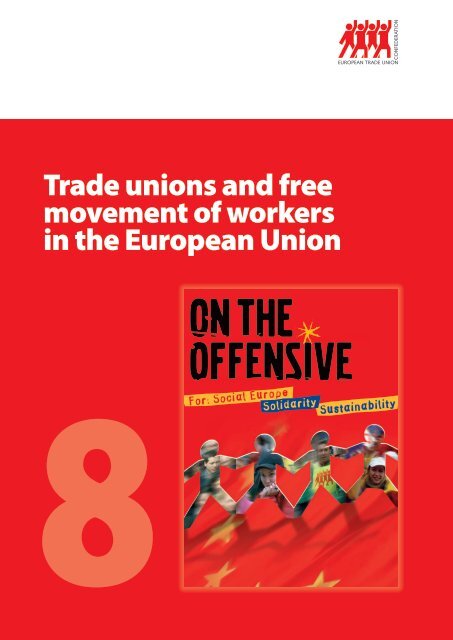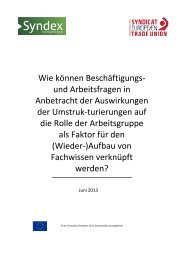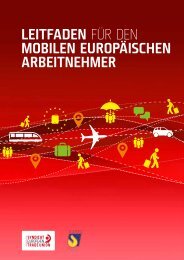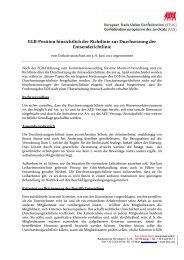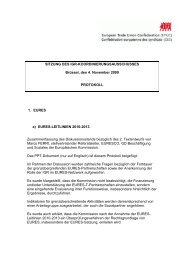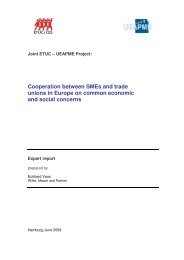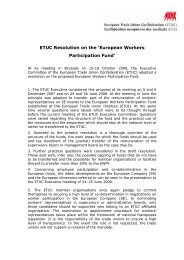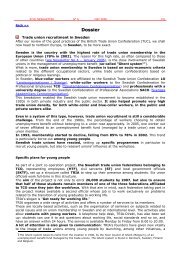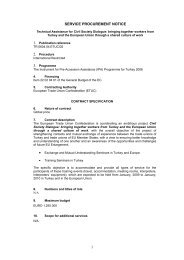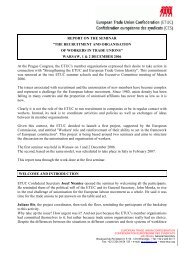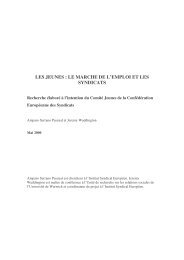Trade unions and free movement of workers in the ... - ETUC
Trade unions and free movement of workers in the ... - ETUC
Trade unions and free movement of workers in the ... - ETUC
Create successful ePaper yourself
Turn your PDF publications into a flip-book with our unique Google optimized e-Paper software.
<strong>Trade</strong> <strong>unions</strong> <strong>and</strong> <strong>free</strong><br />
<strong>movement</strong> <strong>of</strong> <strong>workers</strong><br />
<strong>in</strong> <strong>the</strong> European Union<br />
8
This is one <strong>of</strong> a series <strong>of</strong> tra<strong>in</strong><strong>in</strong>g modules produced<br />
as part <strong>of</strong> an ambitious European project, Civil Society<br />
Dialogue: Br<strong>in</strong>g<strong>in</strong>g toge<strong>the</strong>r <strong>workers</strong> from Turkey <strong>and</strong><br />
<strong>the</strong> EU through a shared culture <strong>of</strong> work, which aims<br />
to ensure better knowledge <strong>and</strong> underst<strong>and</strong><strong>in</strong>g <strong>of</strong><br />
one ano<strong>the</strong>r <strong>and</strong> an awareness <strong>of</strong> <strong>the</strong> challenges <strong>and</strong><br />
opportunities <strong>of</strong> future EU enlargement.<br />
HOW TO USE THIS PUBLICATION<br />
The tra<strong>in</strong><strong>in</strong>g modules are <strong>in</strong>tended to <strong>of</strong>fer a short,<br />
clear <strong>in</strong>troduction to <strong>the</strong> subject for a trade union<br />
audience, <strong>and</strong> each will have an educational activity<br />
that can be used <strong>in</strong> <strong>the</strong> classroom or with groups <strong>of</strong><br />
members. A list <strong>of</strong> all <strong>the</strong> publications <strong>in</strong> this series<br />
can be found below, <strong>and</strong> copies can be downloaded<br />
from <strong>the</strong> <strong>ETUC</strong> website www.etuc.org/r/557<br />
PUBLICATIONS IN THIS SERIES<br />
1. <strong>Trade</strong> <strong>unions</strong> at <strong>the</strong> European level<br />
2. Industrial relations at <strong>the</strong> European level<br />
3. Turkish trade <strong>unions</strong> <strong>and</strong> <strong>in</strong>dustrial relations<br />
4. <strong>Trade</strong> <strong>unions</strong> <strong>and</strong> <strong>in</strong>dustrial relations <strong>in</strong> EU countries<br />
5. <strong>Trade</strong> <strong>unions</strong> <strong>and</strong> women<br />
6. <strong>Trade</strong> <strong>unions</strong> <strong>and</strong> civil society<br />
7. <strong>Trade</strong> <strong>unions</strong> <strong>and</strong> migration <strong>in</strong>to <strong>the</strong> European Union<br />
8. <strong>Trade</strong> <strong>unions</strong> <strong>and</strong> <strong>free</strong>dom <strong>of</strong> <strong>movement</strong> <strong>of</strong> <strong>workers</strong><br />
<strong>in</strong> <strong>the</strong> European Union<br />
9. Work<strong>in</strong>g toge<strong>the</strong>r<br />
<strong>ETUC</strong> MANIFESTO<br />
At its 11th Congress <strong>in</strong> Seville, Spa<strong>in</strong>, <strong>in</strong><br />
May 2007, <strong>the</strong> European <strong>Trade</strong> Union<br />
Confederation (<strong>ETUC</strong>) adopted a Manifesto<br />
for Action for <strong>the</strong> next four years. This<br />
manifesto highlights five ma<strong>in</strong> areas where<br />
<strong>the</strong> <strong>ETUC</strong> is committed to go<strong>in</strong>g ‘on <strong>the</strong><br />
<strong>of</strong>fensive’ on behalf <strong>of</strong> European <strong>workers</strong>:<br />
• <strong>the</strong> European labour market<br />
• social dialogue, collective barga<strong>in</strong><strong>in</strong>g <strong>and</strong><br />
worker participation<br />
• better European economic, social <strong>and</strong><br />
environmental governance<br />
• a stronger European Union<br />
• stronger trade <strong>unions</strong> <strong>and</strong> a stronger <strong>ETUC</strong>.
FOREWORD<br />
The European <strong>Trade</strong> Union Confederation at its<br />
Congress <strong>in</strong> 2007 voted <strong>in</strong> favour <strong>of</strong> <strong>the</strong> accession<br />
<strong>of</strong> Turkey to <strong>the</strong> European Union, ‘provided that it<br />
meets, <strong>in</strong> reality <strong>and</strong> not on paper, <strong>the</strong> requirements<br />
<strong>of</strong> membership <strong>and</strong> <strong>the</strong> provisions <strong>of</strong> <strong>the</strong> EU Charter<br />
<strong>of</strong> Fundamental Rights. A transformation <strong>of</strong> Turkish<br />
society with full rights <strong>and</strong> <strong>free</strong>doms should be<br />
sought <strong>and</strong> completed dur<strong>in</strong>g <strong>the</strong> challeng<strong>in</strong>g<br />
process <strong>of</strong> negotiations’.<br />
It was on this basis that <strong>the</strong> <strong>ETUC</strong>, <strong>and</strong> its affiliated<br />
organisations <strong>in</strong> Turkey <strong>and</strong> <strong>in</strong> <strong>the</strong> European Union,<br />
agreed to step up <strong>the</strong>ir cooperation <strong>and</strong> launch this<br />
ambitious project Civil Society Dialogue: Br<strong>in</strong>g<strong>in</strong>g<br />
toge<strong>the</strong>r <strong>workers</strong> from Turkey <strong>and</strong> <strong>the</strong> EU through a<br />
shared culture <strong>of</strong> work, which aims to ensure better<br />
knowledge <strong>and</strong> underst<strong>and</strong><strong>in</strong>g <strong>of</strong> one ano<strong>the</strong>r <strong>and</strong><br />
an awareness <strong>of</strong> <strong>the</strong> challenges <strong>and</strong> opportunities <strong>of</strong><br />
future EU enlargement.<br />
The central elements <strong>of</strong> <strong>the</strong> project are:<br />
• 12 exchange <strong>and</strong> mutual underst<strong>and</strong><strong>in</strong>g sem<strong>in</strong>ars<br />
for trade unionists com<strong>in</strong>g from different regions <strong>of</strong><br />
Turkey on <strong>the</strong> one h<strong>and</strong> <strong>and</strong> from different Members<br />
States <strong>of</strong> <strong>the</strong> European Union on <strong>the</strong> o<strong>the</strong>r<br />
• 9 tra<strong>in</strong><strong>in</strong>g sem<strong>in</strong>ars, <strong>in</strong> cooperation with European<br />
Industry Federations.<br />
The project has also produced this series <strong>of</strong> tra<strong>in</strong><strong>in</strong>g<br />
modules which will provide an important tool for<br />
build<strong>in</strong>g capacity with<strong>in</strong> <strong>the</strong> <strong>ETUC</strong>, by enabl<strong>in</strong>g<br />
o<strong>the</strong>r <strong>workers</strong> <strong>and</strong> trade unionists from both <strong>the</strong> EU<br />
<strong>and</strong> Turkey to underst<strong>and</strong> <strong>the</strong> challenges ahead <strong>and</strong><br />
to accept cultural, social <strong>and</strong> political differences<br />
more readily.<br />
Thanks are due to:<br />
• <strong>ETUC</strong> affiliated organisations – European Industry<br />
Federations <strong>and</strong> <strong>the</strong> national trade union<br />
confederations from <strong>the</strong> EU <strong>and</strong> Turkey that have<br />
carried this project forward<br />
• <strong>workers</strong> <strong>and</strong> trade unionists from <strong>the</strong> national<br />
<strong>unions</strong> <strong>in</strong> Turkey <strong>and</strong> <strong>the</strong> EU who have taken part <strong>in</strong><br />
<strong>the</strong> different tra<strong>in</strong><strong>in</strong>g activities<br />
• tra<strong>in</strong>ers from <strong>the</strong> national <strong>unions</strong> <strong>in</strong> Turkey <strong>and</strong> <strong>the</strong><br />
EU, <strong>and</strong> Marcus Strohmeier (ÖGB) who coord<strong>in</strong>ated<br />
<strong>the</strong> tra<strong>in</strong><strong>in</strong>g activities <strong>and</strong> contributed to <strong>the</strong>se<br />
booklets<br />
• Nigel Rees (<strong>Trade</strong> Union European Information<br />
Project) who was responsible for edit<strong>in</strong>g <strong>the</strong> orig<strong>in</strong>al<br />
texts for <strong>the</strong>se educational booklets, <strong>and</strong> also Kazim<br />
Ates who was responsible for revis<strong>in</strong>g <strong>the</strong>m<br />
• Laura Fallavollita, Yücel Top <strong>and</strong> <strong>the</strong> o<strong>the</strong>r members<br />
<strong>of</strong> <strong>the</strong> project coord<strong>in</strong>ation committee (Osman<br />
Yildiz, Uğraş Gök <strong>and</strong> Kıvanç Eli Açık), who, under<br />
<strong>the</strong> guidance <strong>of</strong> Joël Decaillon <strong>and</strong> Jeff Bridgford,<br />
have brought <strong>the</strong> project to a successful conclusion.<br />
I commend <strong>the</strong>se tra<strong>in</strong><strong>in</strong>g modules to trade<br />
unionists from <strong>the</strong> affiliated organisations <strong>of</strong> <strong>the</strong><br />
<strong>ETUC</strong>. I encourage you to use <strong>the</strong>m, so that we are<br />
all <strong>in</strong> a better position to defend <strong>workers</strong>’ <strong>in</strong>terests<br />
throughout Turkey <strong>and</strong> <strong>the</strong> European Union.<br />
John Monks<br />
General Secretary<br />
European <strong>Trade</strong> Union Confederation<br />
1
2<br />
CONTEXT<br />
The <strong>ETUC</strong> supports <strong>the</strong> <strong>free</strong>dom <strong>of</strong> <strong>movement</strong> <strong>of</strong><br />
<strong>workers</strong> with<strong>in</strong> <strong>the</strong> European Union <strong>and</strong> a managed<br />
migration system for those outside <strong>the</strong> European<br />
Union, based on <strong>the</strong> pr<strong>in</strong>ciples <strong>of</strong> <strong>workers</strong>’ rights.<br />
<strong>Trade</strong> <strong>unions</strong> <strong>and</strong> migration <strong>in</strong>to <strong>the</strong> EU is covered<br />
<strong>in</strong> tra<strong>in</strong><strong>in</strong>g module 7 <strong>of</strong> this series, <strong>and</strong> this tra<strong>in</strong><strong>in</strong>g<br />
module will concentrate on trade <strong>unions</strong> <strong>and</strong> <strong>free</strong><br />
<strong>movement</strong> <strong>of</strong> <strong>workers</strong> <strong>in</strong> <strong>the</strong> European Union.<br />
The ‘common market’ <strong>of</strong> <strong>the</strong> European Union is based<br />
on <strong>the</strong> famous ‘four <strong>free</strong>doms’: <strong>of</strong> persons, services,<br />
goods <strong>and</strong> capital. This is reiterated <strong>in</strong> Article 45 <strong>of</strong> <strong>the</strong><br />
Treaty <strong>of</strong> Lisbon – ‘<strong>free</strong>dom <strong>of</strong> <strong>movement</strong> for <strong>workers</strong><br />
shall be secured with<strong>in</strong> <strong>the</strong> Union, <strong>and</strong> such <strong>free</strong>dom <strong>of</strong><br />
<strong>movement</strong> shall entail <strong>the</strong> abolition <strong>of</strong> any discrim<strong>in</strong>ation<br />
based on nationality between <strong>workers</strong> <strong>of</strong> <strong>the</strong> Member<br />
States as regards employment, remuneration <strong>and</strong> o<strong>the</strong>r<br />
conditions <strong>of</strong> work <strong>and</strong> employment’.<br />
These represent significant advances for work<strong>in</strong>g<br />
people, particularly when compared with <strong>the</strong> difficulties<br />
that existed beforeh<strong>and</strong> <strong>in</strong> obta<strong>in</strong><strong>in</strong>g work permits.<br />
Clearly <strong>the</strong>se rights are important for frontier <strong>workers</strong><br />
who live <strong>in</strong> one Member State <strong>and</strong> work <strong>in</strong> ano<strong>the</strong>r, but<br />
equally it means, for example, that an Italian can work<br />
<strong>and</strong> settle <strong>in</strong> Sweden <strong>and</strong> a Spaniard <strong>in</strong> Irel<strong>and</strong>.<br />
Importantly for European trade unionists, <strong>workers</strong><br />
have <strong>the</strong> right to equal treatment <strong>in</strong> respect <strong>of</strong> access<br />
to employment, work<strong>in</strong>g conditions <strong>and</strong> all o<strong>the</strong>r<br />
advantages which could help to facilitate <strong>the</strong> worker’s<br />
<strong>in</strong>tegration <strong>in</strong>to <strong>the</strong> host Member State. Workers<br />
com<strong>in</strong>g from ano<strong>the</strong>r EU Member State cannot be<br />
discrim<strong>in</strong>ated aga<strong>in</strong>st on <strong>the</strong> grounds <strong>of</strong> nationality.<br />
They must be treated <strong>in</strong> exactly <strong>the</strong> same way as <strong>workers</strong><br />
from <strong>the</strong> host country. More details can be found <strong>in</strong> a<br />
guide produced by <strong>the</strong> European Commission on this<br />
subject Do you want to work <strong>in</strong> ano<strong>the</strong>r EU Member<br />
State? – F<strong>in</strong>d out about your rights!.<br />
It is <strong>the</strong> case however that on <strong>the</strong> occasion <strong>of</strong> <strong>the</strong> EU<br />
Enlargement <strong>in</strong> May 2004, <strong>the</strong> ‘old’ Member States<br />
obta<strong>in</strong>ed a derogation <strong>of</strong> <strong>the</strong> right to <strong>free</strong> <strong>movement</strong><br />
<strong>of</strong> <strong>workers</strong> to protect <strong>the</strong>ir labour markets.<br />
‘Transitional measures’ were agreed, giv<strong>in</strong>g <strong>the</strong> EU15<br />
Member States <strong>the</strong> option to restrict access to <strong>the</strong>ir<br />
labour markets to <strong>workers</strong> from <strong>the</strong> EU8 countries<br />
<strong>of</strong> Central <strong>and</strong> Eastern Europe. Three Member States<br />
(Irel<strong>and</strong>, Sweden <strong>and</strong> <strong>the</strong> United K<strong>in</strong>gdom) chose<br />
not to <strong>in</strong>troduce <strong>the</strong>m <strong>and</strong> o<strong>the</strong>rs (F<strong>in</strong>l<strong>and</strong>, Greece,<br />
Italy, Luxembourg, <strong>the</strong> Ne<strong>the</strong>rl<strong>and</strong>s Portugal, Spa<strong>in</strong>)<br />
dropped <strong>the</strong>m after a few years. They are to be<br />
phased out completely <strong>in</strong> 2011.<br />
The right to <strong>free</strong> <strong>movement</strong> was given a boost <strong>in</strong> 1985<br />
when Germany, France <strong>and</strong> <strong>the</strong> Benelux countries<br />
(Belgium, <strong>the</strong> Ne<strong>the</strong>rl<strong>and</strong>s <strong>and</strong> Luxembourg)<br />
signed an <strong>in</strong>tergovernmental agreement on<br />
gradually abolish<strong>in</strong>g <strong>in</strong>ternal border checks <strong>in</strong> <strong>the</strong><br />
small Luxembourg border town <strong>of</strong> Schengen. The<br />
Schengen Agreement was followed <strong>in</strong> 1990 by <strong>the</strong><br />
Schengen Convention, which f<strong>in</strong>ally came <strong>in</strong>to force<br />
<strong>in</strong> 1995. It now covers 22 EU Member States (Belgium,<br />
<strong>the</strong> Czech Republic, Denmark, Estonia, Germany,<br />
Greece, Spa<strong>in</strong>, France, Hungary, Italy, Latvia, Lithuania,<br />
Luxembourg, Malta, <strong>the</strong> Ne<strong>the</strong>rl<strong>and</strong>s, Austria, Pol<strong>and</strong>,<br />
Portugal, F<strong>in</strong>l<strong>and</strong>, Slovakia, Slovenia <strong>and</strong> Sweden)<br />
plus Icel<strong>and</strong>, Norway <strong>and</strong> Switzerl<strong>and</strong>.<br />
The right to look for a job has been supported by<br />
an <strong>in</strong>itiative set up by <strong>the</strong> European Commission<br />
– <strong>the</strong> European Job Mobility Portal. It provides<br />
<strong>in</strong>formation about job opportunities with<strong>in</strong> <strong>the</strong><br />
European Union, <strong>the</strong> rules <strong>and</strong> procedures l<strong>in</strong>ked<br />
to employment <strong>in</strong> different countries <strong>and</strong> practical<br />
<strong>in</strong>formation liv<strong>in</strong>g <strong>and</strong> work<strong>in</strong>g conditions.<br />
http://ec.europa.eu/eures/<br />
Th<strong>in</strong>gs to consider<br />
What are <strong>the</strong> pros <strong>and</strong> cons <strong>of</strong> go<strong>in</strong>g abroad<br />
to work? Would you consider go<strong>in</strong>g abroad<br />
to work?
This does not mean that work<strong>in</strong>g men <strong>and</strong> women<br />
will automatically decide to go <strong>and</strong> live abroad<br />
to work, but it does mean that <strong>the</strong>y can, legally, if<br />
<strong>the</strong>y so wish. There are obvious obstacles to <strong>the</strong><br />
<strong>free</strong> <strong>movement</strong> <strong>of</strong> <strong>workers</strong>, not least <strong>the</strong> challenge<br />
<strong>of</strong> liv<strong>in</strong>g away from home <strong>in</strong> ano<strong>the</strong>r country with<br />
a different culture <strong>and</strong> a different language. There<br />
are o<strong>the</strong>rs potential obstacles too – access to<br />
social security systems, portability <strong>of</strong> pensions <strong>and</strong><br />
recognition <strong>of</strong> educational <strong>and</strong> tra<strong>in</strong><strong>in</strong>g qualifications<br />
– which are be<strong>in</strong>g addressed by <strong>the</strong> European Union.<br />
POTENTIAL OBSTACLES TO THE<br />
FREE MOVEMENT OF WORKERS<br />
1. Access to social security systems<br />
A serious obstacle to <strong>free</strong> <strong>movement</strong> <strong>of</strong> <strong>workers</strong><br />
<strong>in</strong>itially was <strong>the</strong> exclusive nature <strong>of</strong> national social<br />
security systems. This was addressed by Regulation<br />
(EEC) No 1408/71, which provided for equal treatment<br />
for all EU nationals, as regards <strong>the</strong> follow<strong>in</strong>g aspects<br />
<strong>of</strong> social security schemes – sickness <strong>and</strong> maternity<br />
benefits, <strong>in</strong>validity benefits, old age benefits, survivors’<br />
benefits, benefits <strong>in</strong> respect <strong>of</strong> accidents at work <strong>and</strong><br />
occupational diseases, unemployment benefits, family<br />
benefits <strong>and</strong> death grants. A subsequent problem was<br />
<strong>the</strong> <strong>in</strong>ability to accumulate rights when mov<strong>in</strong>g from<br />
one national system to ano<strong>the</strong>r, which was addressed<br />
by a Regulation (EC) No 883/2004 simplify<strong>in</strong>g <strong>and</strong><br />
clarify<strong>in</strong>g <strong>the</strong> Community rules for <strong>the</strong> coord<strong>in</strong>ation<br />
<strong>of</strong> Member States’ social security systems. More<br />
<strong>in</strong>formation on <strong>the</strong>se issues can be obta<strong>in</strong>ed for a<br />
guide published by <strong>the</strong> European Commission The<br />
Community provisions on social security.<br />
Ano<strong>the</strong>r obstacle has been overcome <strong>in</strong> a highly<br />
visible <strong>and</strong> practical way. A European Health<br />
Insurance Card has been <strong>in</strong>troduced. This can be<br />
used to obta<strong>in</strong> public sector health care (from a<br />
doctor, a pharmacy or a hospital) dur<strong>in</strong>g a temporary<br />
stay <strong>in</strong> a Member State o<strong>the</strong>r than <strong>the</strong> one <strong>in</strong> which<br />
<strong>the</strong> person is <strong>in</strong>sured.<br />
2. Portability <strong>of</strong> pensions<br />
Ano<strong>the</strong>r potential obstacle to <strong>the</strong> <strong>free</strong> <strong>movement</strong><br />
<strong>of</strong> <strong>workers</strong> has been <strong>the</strong> loss <strong>of</strong> recognition <strong>of</strong><br />
contributions to pension schemes. This has generally<br />
been resolved for state pension schemes, but this<br />
is far from be<strong>in</strong>g <strong>the</strong> case for o<strong>the</strong>r types such as<br />
supplementary occupational pension schemes<br />
which are most <strong>of</strong>ten provided by employers.<br />
After fifteen years <strong>of</strong> discussions, some <strong>in</strong>volv<strong>in</strong>g<br />
<strong>the</strong> social partners, no voluntary agreement was<br />
reached, <strong>and</strong> <strong>the</strong> European Commission put forward<br />
a new Directive. It proposed a duty on national<br />
governments to adjust pension benefits left beh<strong>in</strong>d<br />
by a mobile worker so that no loss was <strong>in</strong>curred, to<br />
confer a right <strong>of</strong> pension transfer to <strong>the</strong> new employer<br />
<strong>and</strong> to restrict wait<strong>in</strong>g periods to one year, vest<strong>in</strong>g<br />
periods to two years <strong>and</strong> vest<strong>in</strong>g ages to twentyone<br />
or younger. However, <strong>the</strong> European Parliament<br />
passed several amendments to <strong>the</strong> proposal which<br />
effectively removed <strong>the</strong> right to transfer. It also<br />
<strong>in</strong>creased <strong>the</strong> maximum allowed vest<strong>in</strong>g period to<br />
five years <strong>and</strong> <strong>the</strong> vest<strong>in</strong>g age to twenty-five.<br />
The <strong>ETUC</strong> described <strong>the</strong> decision taken by <strong>the</strong><br />
European Parliament as hav<strong>in</strong>g taken ‘a step<br />
backwards’ <strong>and</strong> po<strong>in</strong>ted out <strong>the</strong> disadvantages to<br />
<strong>workers</strong> on successive fixed term contracts who<br />
would never f<strong>in</strong>ish a five year vest<strong>in</strong>g period <strong>and</strong><br />
to young people under twenty-five who could not<br />
beg<strong>in</strong> mak<strong>in</strong>g contributions count, add<strong>in</strong>g that <strong>the</strong><br />
obligation on employers to <strong>in</strong>form <strong>workers</strong> about <strong>the</strong><br />
consequences for <strong>the</strong>ir pensions <strong>of</strong> chang<strong>in</strong>g jobs<br />
had been watered down.<br />
Fur<strong>the</strong>r progress on this proposal is awaited.<br />
3
4<br />
3. Recognition <strong>of</strong> educational <strong>and</strong> tra<strong>in</strong><strong>in</strong>g<br />
qualifications<br />
A fur<strong>the</strong>r potential obstacle to <strong>free</strong>dom <strong>of</strong> <strong>movement</strong><br />
with<strong>in</strong> <strong>the</strong> EU has been <strong>the</strong> recognition <strong>of</strong> educational<br />
<strong>and</strong> tra<strong>in</strong><strong>in</strong>g qualifications. In 2008 <strong>the</strong> European<br />
Parliament <strong>and</strong> <strong>the</strong> Council agreed a Recommendation<br />
to create a European Qualifications Framework<br />
(EQF) that would make national qualifications more<br />
readable across all <strong>the</strong> EU Member States <strong>and</strong> <strong>in</strong> this<br />
way support <strong>the</strong> <strong>free</strong>dom <strong>of</strong> <strong>movement</strong> <strong>of</strong> <strong>workers</strong>.<br />
This Recommendation encourages countries to relate<br />
<strong>the</strong>ir qualifications systems or frameworks to <strong>the</strong> EQF<br />
by 2010 <strong>and</strong> to ensure that all new qualifications<br />
issued from 2012 onwards carry a reference to <strong>the</strong><br />
appropriate EQF level.<br />
The EQF is divided <strong>in</strong>to eight reference levels describ<strong>in</strong>g<br />
what a learner knows, underst<strong>and</strong>s <strong>and</strong> is able to do<br />
– ‘learn<strong>in</strong>g outcomes’. Levels <strong>of</strong> national qualifications<br />
will be placed at one <strong>of</strong> <strong>the</strong> central reference levels,<br />
rang<strong>in</strong>g from basic (Level 1) to advanced (Level 8). It<br />
should <strong>the</strong>refore enable easier comparisons between<br />
national qualifications. It should also mean that<br />
<strong>workers</strong> do not have to repeat learn<strong>in</strong>g if <strong>the</strong>y move<br />
from one country to ano<strong>the</strong>r or be employed at levels<br />
below what <strong>the</strong>y could expect on <strong>the</strong> basis <strong>of</strong> <strong>the</strong>ir<br />
educational <strong>and</strong> tra<strong>in</strong><strong>in</strong>g achievements.<br />
In addition <strong>in</strong> 2009 <strong>the</strong> European Parliament <strong>and</strong><br />
<strong>the</strong> Council agreed a recommendation on <strong>the</strong><br />
establishment <strong>of</strong> a European Credit System for<br />
Vocational Education <strong>and</strong> Tra<strong>in</strong><strong>in</strong>g (ECVET). This<br />
system will make it possible to facilitate <strong>the</strong> transfer <strong>of</strong><br />
assessed learn<strong>in</strong>g outcomes from one Member State<br />
to ano<strong>the</strong>r <strong>and</strong> <strong>in</strong> this way improve <strong>the</strong> recognition<br />
<strong>of</strong> qualifications <strong>in</strong> vocational tra<strong>in</strong><strong>in</strong>g.<br />
CLASHES BETWEEN FREEDOMS –<br />
THE RULINGS OF THE EUROPEAN<br />
COURT OF JUSTICE<br />
Whilst <strong>the</strong> <strong>free</strong>dom <strong>of</strong> <strong>movement</strong> <strong>of</strong> <strong>workers</strong><br />
has generally been welcomed by trade union<br />
organisations throughout <strong>the</strong> European Union, a<br />
less positive side is emerg<strong>in</strong>g, <strong>the</strong> underm<strong>in</strong><strong>in</strong>g <strong>of</strong><br />
<strong>workers</strong>’ fundamental rights, as a result <strong>of</strong> <strong>the</strong> rul<strong>in</strong>gs<br />
<strong>of</strong> <strong>the</strong> European Court <strong>of</strong> Justice (ECJ).<br />
The European Court <strong>of</strong> Justice has an important role<br />
to play <strong>in</strong> review<strong>in</strong>g <strong>the</strong> legality <strong>of</strong> <strong>the</strong> acts <strong>of</strong> <strong>the</strong><br />
<strong>in</strong>stitutions <strong>of</strong> <strong>the</strong> European Union, ensur<strong>in</strong>g that<br />
Member States comply with <strong>the</strong>ir obligations under<br />
<strong>the</strong> Treaties, <strong>and</strong> <strong>in</strong> <strong>in</strong>terpret<strong>in</strong>g European Union law.<br />
Recently it has made a series <strong>of</strong> rul<strong>in</strong>gs that have farreach<strong>in</strong>g<br />
implications for trade <strong>unions</strong> <strong>and</strong> <strong>workers</strong><br />
<strong>in</strong> Europe, <strong>and</strong> for fundamental <strong>workers</strong>’ rights,<br />
collective barga<strong>in</strong><strong>in</strong>g <strong>and</strong> <strong>in</strong>dustrial action <strong>in</strong> <strong>the</strong><br />
Member States.<br />
The first <strong>and</strong> best-known case is <strong>the</strong> Laval case<br />
(also known as <strong>the</strong> Vaxholm case). There are o<strong>the</strong>rs,<br />
Rüffert, Vik<strong>in</strong>g <strong>and</strong> Luxembourg, which all go <strong>in</strong> a<br />
similar direction.<br />
The Laval case illustrates this new trend. A Latvian<br />
company Laval won a contract to build a new school<br />
<strong>in</strong> Sweden <strong>and</strong> imported Latvian construction<br />
<strong>workers</strong> to do <strong>the</strong> work. It refused however to come<br />
to an agreement with <strong>the</strong> appropriate Swedish trade<br />
union, preferr<strong>in</strong>g to pay Latvian rates <strong>of</strong> pay. When<br />
<strong>the</strong> Swedish trade union <strong>in</strong> question, Byggnads,<br />
organised a blockade <strong>of</strong> <strong>the</strong> site, Laval brought an<br />
action aga<strong>in</strong>st <strong>the</strong>m which eventually reached <strong>the</strong><br />
ECJ. In its judgment <strong>the</strong> court allowed that <strong>unions</strong><br />
could take <strong>in</strong>dustrial action for ‘overrid<strong>in</strong>g reasons<br />
<strong>of</strong> public <strong>in</strong>terest’, <strong>in</strong>clud<strong>in</strong>g direct undercutt<strong>in</strong>g<br />
<strong>of</strong> local wages, however this did not apply when<br />
m<strong>in</strong>imum st<strong>and</strong>ards were observed. These st<strong>and</strong>ards<br />
were embodied <strong>in</strong> <strong>the</strong> Post<strong>in</strong>g <strong>of</strong> Workers Directive<br />
(cover<strong>in</strong>g <strong>workers</strong> that cross <strong>the</strong> borders <strong>in</strong> <strong>the</strong><br />
framework <strong>of</strong> services).
In <strong>the</strong> Vik<strong>in</strong>g judgment a similar balance was struck. A<br />
ferry company sought to re-flag a ship from F<strong>in</strong>l<strong>and</strong> to<br />
Estonia so that <strong>the</strong>y could employ Estonian crews on<br />
<strong>the</strong> lower wages exist<strong>in</strong>g <strong>in</strong> that country. The F<strong>in</strong>nish<br />
Seamen’s Union <strong>in</strong>formed <strong>the</strong> International Transport<br />
Workers Federation (ITF) <strong>of</strong> Vik<strong>in</strong>g’s <strong>in</strong>tention, <strong>and</strong> <strong>the</strong><br />
federation organised a boycott forbidd<strong>in</strong>g all <strong>unions</strong><br />
from negotiat<strong>in</strong>g with <strong>the</strong> firm. Aga<strong>in</strong> <strong>the</strong> case reached<br />
<strong>the</strong> European Court <strong>of</strong> Justice for a decision on <strong>the</strong><br />
conflict<strong>in</strong>g pr<strong>in</strong>ciples. Although <strong>the</strong> ECJ affirmed <strong>the</strong><br />
right to take collective action under <strong>the</strong> European Social<br />
Charter <strong>and</strong> <strong>the</strong> International Labour Organisation (ILO)<br />
conventions, it ruled that this must be ‘proportionate’<br />
<strong>and</strong> ‘not go beyond what is necessary’. It was for<br />
national courts to decide what action was suitable <strong>in</strong><br />
each case.<br />
In Rüffert a case was brought, not aga<strong>in</strong>st a trade<br />
union, but aga<strong>in</strong>st a local authority. The German<br />
region <strong>of</strong> Lower Saxony operated a procurement<br />
policy which <strong>in</strong>sisted that companies w<strong>in</strong>n<strong>in</strong>g<br />
contracts with it must pay wages at <strong>the</strong> rate<br />
stipulated <strong>in</strong> <strong>the</strong> applicable collective agreement.<br />
However when Objekt und Bauregie GmbH & Co. was<br />
successful <strong>in</strong> tender<strong>in</strong>g for build<strong>in</strong>g work, <strong>the</strong>y subcontracted<br />
this to a Polish firm whose <strong>workers</strong> were<br />
receiv<strong>in</strong>g less than half <strong>the</strong> agreed m<strong>in</strong>imum wage<br />
for <strong>the</strong> sector. The local authority <strong>the</strong>n withdrew <strong>the</strong><br />
contract , <strong>and</strong> Dirk Rüffert, on behalf <strong>of</strong> <strong>the</strong> company<br />
<strong>in</strong> question, took <strong>the</strong> case to <strong>the</strong> European Court <strong>of</strong><br />
Justice. Bas<strong>in</strong>g its decision on <strong>the</strong> provisions <strong>of</strong> <strong>the</strong><br />
Post<strong>in</strong>g <strong>of</strong> Workers Directive <strong>the</strong> ECJ ruled that <strong>the</strong><br />
Lower Saxony region could not <strong>in</strong>sist on <strong>the</strong> agreed<br />
m<strong>in</strong>imum, because only collective agreements that<br />
were ‘universally applicable’ were allowed by <strong>the</strong><br />
Directive. Because <strong>the</strong> procurement policy only<br />
applied to <strong>the</strong> public sector it was not ‘observed by<br />
all undertak<strong>in</strong>gs <strong>in</strong> <strong>the</strong> geographical area <strong>and</strong> <strong>in</strong> <strong>the</strong><br />
pr<strong>of</strong>ession or <strong>in</strong>dustry concerned’.<br />
The f<strong>in</strong>al judgment <strong>of</strong> <strong>the</strong> four was made aga<strong>in</strong>st a<br />
Member State government. In Luxembourg <strong>the</strong><br />
Post<strong>in</strong>g <strong>of</strong> Workers Directive had been implemented<br />
<strong>in</strong> such a way that foreign companies were required<br />
to provide a written contract <strong>of</strong> employment, to raise<br />
pay with <strong>the</strong> cost <strong>of</strong> liv<strong>in</strong>g <strong>and</strong> to respect collective<br />
agreements <strong>and</strong> rules on part-time work. National<br />
legislation also <strong>in</strong>sisted that <strong>the</strong>y provide <strong>in</strong>formation<br />
to labour <strong>in</strong>spectors on request <strong>and</strong> always have<br />
a representative <strong>in</strong> <strong>the</strong> country. The European<br />
Commission regarded <strong>the</strong>se laws as hav<strong>in</strong>g ‘overimplemented’<br />
<strong>the</strong> Post<strong>in</strong>g <strong>of</strong> Workers Directive, <strong>and</strong><br />
<strong>the</strong> ECJ agreed with <strong>the</strong>m. The law <strong>in</strong> Luxembourg<br />
will now have to be re-written.<br />
THE <strong>ETUC</strong> RESPONSE<br />
The <strong>ETUC</strong> considers that <strong>the</strong> four recent ECJ cases<br />
have exposed <strong>the</strong> weaknesses <strong>in</strong> <strong>the</strong> current EU legal<br />
framework applicable to fundamental social rights<br />
<strong>and</strong> <strong>the</strong> <strong>free</strong> <strong>movement</strong> <strong>of</strong> <strong>workers</strong> <strong>and</strong> services.<br />
The ECJ has confirmed a hierarchy <strong>of</strong> norms, with<br />
market <strong>free</strong>doms highest <strong>in</strong> <strong>the</strong> hierarchy, <strong>and</strong> <strong>the</strong><br />
fundamental social rights <strong>of</strong> collective barga<strong>in</strong><strong>in</strong>g<br />
<strong>and</strong> action <strong>in</strong> second place. The ECJ has <strong>in</strong>terpreted<br />
<strong>the</strong> Post<strong>in</strong>g <strong>of</strong> Workers Directive, <strong>in</strong> a very restrictive<br />
way, limit<strong>in</strong>g <strong>the</strong> scope for trade <strong>unions</strong> to take<br />
action aga<strong>in</strong>st ‘social dump<strong>in</strong>g’ – unfair competition<br />
on wages <strong>and</strong> work<strong>in</strong>g conditions lead<strong>in</strong>g to a spiral<br />
downwards – <strong>and</strong> to guarantee equal treatment <strong>of</strong><br />
local <strong>and</strong> migrant <strong>workers</strong> <strong>in</strong> <strong>the</strong> host country.<br />
The <strong>ETUC</strong> considers that a European labour market<br />
requires European ‘rules <strong>of</strong> <strong>the</strong> game’, which comb<strong>in</strong>e<br />
open borders with adequate protection. The key<br />
conditions for this are:<br />
• equal wages <strong>and</strong> work<strong>in</strong>g conditions for work <strong>of</strong> <strong>the</strong><br />
same value on <strong>the</strong> same territory<br />
• full respect for national collective barga<strong>in</strong><strong>in</strong>g <strong>and</strong><br />
<strong>in</strong>dustrial relations systems as <strong>in</strong>dispensable <strong>and</strong><br />
dynamic tools to manage change <strong>in</strong> a democratic way<br />
• equal access <strong>of</strong> all <strong>workers</strong> to social benefits<br />
• proper <strong>in</strong>struments <strong>and</strong> tools for monitor<strong>in</strong>g,<br />
enforcement <strong>and</strong> application <strong>in</strong> practice for<br />
stakeholders at all relevant levels, <strong>in</strong>clud<strong>in</strong>g <strong>the</strong><br />
social partners.<br />
5
6<br />
The EU needs a rigorous commitment from its<br />
Member States to fully implement <strong>the</strong> <strong>free</strong> <strong>movement</strong><br />
<strong>of</strong> <strong>workers</strong> provisions <strong>of</strong> <strong>the</strong> Treaty across <strong>the</strong> EU,<br />
based on equal treatment <strong>and</strong> non-discrim<strong>in</strong>ation <strong>of</strong><br />
<strong>workers</strong> <strong>and</strong> companies <strong>in</strong> <strong>the</strong> place where <strong>the</strong> work<br />
is done (<strong>the</strong> host country pr<strong>in</strong>ciple).<br />
Member States, where appropriate <strong>in</strong> cooperation<br />
with social partners, should more actively <strong>and</strong><br />
<strong>in</strong>tensively <strong>in</strong>form <strong>the</strong>ir population on <strong>the</strong> legal<br />
framework for <strong>free</strong> <strong>movement</strong> <strong>of</strong> <strong>workers</strong> <strong>and</strong> <strong>the</strong><br />
rights <strong>of</strong> <strong>the</strong> <strong>workers</strong> <strong>in</strong>volved <strong>in</strong> order to reduce<br />
unfounded fears <strong>and</strong> concerns.<br />
Member States <strong>in</strong> consultation with social partners<br />
should, where necessary, address <strong>the</strong> weaknesses<br />
<strong>of</strong> <strong>the</strong>ir national systems which may lead to an<br />
<strong>in</strong>crease <strong>in</strong> undeclared work, non-application <strong>of</strong><br />
labour st<strong>and</strong>ards <strong>and</strong> unfair competition on wages<br />
<strong>and</strong> work<strong>in</strong>g conditions, <strong>and</strong> make <strong>the</strong>m ‘mobility<br />
pro<strong>of</strong>’. This can help reconsideration <strong>of</strong> replac<strong>in</strong>g<br />
transitional restrictions, where still exist<strong>in</strong>g, by<br />
appropriate conditions for open borders.<br />
The <strong>ETUC</strong> has a two-pronged approach. First <strong>of</strong> all<br />
it is engaged <strong>in</strong> work<strong>in</strong>g to <strong>in</strong>fluence <strong>the</strong> decisionmak<strong>in</strong>g<br />
process <strong>of</strong> <strong>the</strong> European Union (for more<br />
details, see booklet 2 Industrial Relations at <strong>the</strong><br />
European level).<br />
The <strong>ETUC</strong> has <strong>the</strong> follow<strong>in</strong>g proposals:<br />
• revision <strong>of</strong> <strong>the</strong> Post<strong>in</strong>g <strong>of</strong> Workers Directive,<br />
to streng<strong>the</strong>n it <strong>and</strong> better achieve its aims <strong>of</strong><br />
guarantee<strong>in</strong>g fair competition <strong>and</strong> <strong>the</strong> respect for<br />
<strong>workers</strong>’ rights<br />
• streng<strong>the</strong>n<strong>in</strong>g <strong>of</strong> <strong>the</strong> so-called ‘Information Directive’<br />
(about <strong>the</strong> m<strong>in</strong>imum <strong>in</strong>formation that <strong>workers</strong><br />
should receive from <strong>the</strong>ir employer regard<strong>in</strong>g <strong>the</strong>ir<br />
employment relationship) to <strong>in</strong>clude all relevant<br />
provisions regard<strong>in</strong>g <strong>the</strong>ir employment situation <strong>in</strong><br />
<strong>the</strong> host country especially <strong>in</strong> situations <strong>of</strong> post<strong>in</strong>g<br />
• <strong>the</strong> addition <strong>of</strong> a Social Progress Protocol to <strong>the</strong><br />
Treaties, confirm<strong>in</strong>g social progress as a clear<br />
objective <strong>of</strong> <strong>the</strong> <strong>in</strong>ternal market.<br />
Secondly, <strong>the</strong> <strong>ETUC</strong> proposes <strong>the</strong> adaptation <strong>of</strong><br />
trade union actions, activities <strong>and</strong> structures, <strong>in</strong><br />
order to provide <strong>the</strong> <strong>workers</strong> concerned, especially<br />
those temporarily work<strong>in</strong>g abroad, with adequate<br />
<strong>and</strong> effective <strong>in</strong>formation, support <strong>and</strong> protection<br />
regard<strong>in</strong>g <strong>the</strong>ir social <strong>and</strong> labour rights. It is now more<br />
urgent than ever to <strong>in</strong>vest <strong>in</strong> cross border solidarity.<br />
Mutual aid systems between <strong>unions</strong> cross border on<br />
a bilateral as well as multilateral basis must be fur<strong>the</strong>r<br />
developed, build<strong>in</strong>g on exist<strong>in</strong>g good practice, <strong>and</strong><br />
<strong>the</strong> possibility for wider cooperation under <strong>the</strong> <strong>ETUC</strong><br />
umbrella must be explored.<br />
One example <strong>of</strong> support has been provided by<br />
<strong>the</strong> <strong>Trade</strong>s Union Congress. Once <strong>in</strong> <strong>the</strong> UK, many<br />
migrant <strong>workers</strong> are unaware <strong>of</strong> <strong>the</strong>ir legal rights or<br />
unable to enforce <strong>the</strong>m <strong>and</strong> face exploitation at work<br />
as a result. For that reason <strong>the</strong> TUC has produced a<br />
series <strong>of</strong> leaflets for people com<strong>in</strong>g to work <strong>in</strong> <strong>the</strong> UK,<br />
giv<strong>in</strong>g <strong>in</strong>formation about legal rights to work. These<br />
booklets are available <strong>in</strong> many EU languages (Czech,<br />
Estonian, French, Hungarian, Latvian, Lithuanian,<br />
Polish, Portuguese, Slovak <strong>and</strong> Spanish) <strong>and</strong> also<br />
Russian. This <strong>in</strong>formation is be<strong>in</strong>g prepared also <strong>in</strong><br />
Turkish.<br />
Free <strong>movement</strong> <strong>of</strong> <strong>workers</strong> is a fundamental right, a<br />
<strong>free</strong>dom <strong>and</strong> not an obligation.<br />
Too <strong>of</strong>ten, politicians promote high levels <strong>of</strong> mobility<br />
as an aim <strong>in</strong> itself, but <strong>the</strong> European Union needs<br />
to reflect on how much mobility it really needs.<br />
Increased <strong>and</strong> accelerated mobility levels may also<br />
have negative side effects, lead<strong>in</strong>g for example to<br />
erosion <strong>of</strong> communities <strong>and</strong> local cohesion. If people<br />
are forced to exchange one precarious job for ano<strong>the</strong>r<br />
one, job mobility is not someth<strong>in</strong>g to be welcomed.
When high skilled <strong>workers</strong> are forced to move out<br />
<strong>of</strong> poverty, to earn more <strong>in</strong> ano<strong>the</strong>r country where<br />
<strong>the</strong>y are employed far below <strong>the</strong>ir skills level, this is<br />
a waste <strong>of</strong> human capital. Some countries, which<br />
<strong>in</strong>stead <strong>of</strong> <strong>in</strong>vest<strong>in</strong>g <strong>in</strong> employment at home relied<br />
heavily on <strong>the</strong>ir <strong>workers</strong> be<strong>in</strong>g employed elsewhere,<br />
are now faced with return-migration <strong>of</strong> thous<strong>and</strong>s <strong>of</strong><br />
<strong>workers</strong> that <strong>the</strong>y cannot <strong>of</strong>fer proper employment.<br />
Activity<br />
Free <strong>movement</strong> <strong>of</strong> <strong>workers</strong> <strong>in</strong> <strong>the</strong><br />
European Union<br />
AIMS<br />
To enable you to:<br />
• underst<strong>and</strong> your rights to <strong>free</strong>dom <strong>of</strong><br />
<strong>movement</strong><br />
• th<strong>in</strong>k through what support <strong>workers</strong> might<br />
need <strong>in</strong> your country<br />
• determ<strong>in</strong>e how your union can help<br />
TASK<br />
Consider <strong>the</strong> k<strong>in</strong>ds <strong>of</strong> support you th<strong>in</strong>k migrant<br />
<strong>workers</strong> might need when work<strong>in</strong>g <strong>in</strong> your<br />
country. You might want to consider:<br />
• employment rights<br />
• health <strong>and</strong> safety regulations<br />
• language<br />
• qualifications<br />
• o<strong>the</strong>r<br />
Research <strong>the</strong> arrangements <strong>in</strong> place <strong>in</strong> your<br />
country to support migrant <strong>workers</strong>. Check<br />
your union website <strong>and</strong> o<strong>the</strong>r useful sources <strong>of</strong><br />
<strong>in</strong>formation.<br />
What are <strong>the</strong> steps your union would need to<br />
take to br<strong>in</strong>g about improvements on what is<br />
on <strong>of</strong>fer?<br />
7
8<br />
FURTHER INFORMATION<br />
The European <strong>Trade</strong> Union Confederation (<strong>ETUC</strong>)<br />
was set up <strong>in</strong> 1973 to promote <strong>the</strong> <strong>in</strong>terests <strong>of</strong><br />
work<strong>in</strong>g people at European level <strong>and</strong> to represent<br />
<strong>the</strong>m <strong>in</strong> <strong>the</strong> EU <strong>in</strong>stitutions. The <strong>ETUC</strong>’s objective is<br />
an EU with a strong social dimension that safeguards<br />
<strong>the</strong> wellbe<strong>in</strong>g <strong>of</strong> all its citizens. At present, <strong>the</strong><br />
<strong>ETUC</strong> has <strong>in</strong> membership 82 national trade union<br />
confederations from 36 European countries, as well<br />
as 12 European Industry Federations, plus observer<br />
organisations <strong>in</strong> Macedonia, Serbia, <strong>and</strong> Bosnia <strong>and</strong><br />
Herzegov<strong>in</strong>a. O<strong>the</strong>r trade union structures such as<br />
EUROCADRES (<strong>the</strong> Council <strong>of</strong> European Pr<strong>of</strong>essional<br />
<strong>and</strong> Managerial Staff) <strong>and</strong> EFREP/FERPA (European<br />
Federation <strong>of</strong> Retired <strong>and</strong> Elderly Persons) operate<br />
under <strong>the</strong> auspices <strong>of</strong> <strong>the</strong> <strong>ETUC</strong>. In addition, <strong>the</strong><br />
<strong>ETUC</strong> coord<strong>in</strong>ates <strong>the</strong> activities <strong>of</strong> <strong>the</strong> 45 IRTUCs<br />
(Interregional <strong>Trade</strong> Union Councils), which organise<br />
trade union cooperation at a cross-border level.<br />
The <strong>ETUC</strong> is one <strong>of</strong> <strong>the</strong> European social partners <strong>and</strong> is<br />
recognised by <strong>the</strong> European Union, by <strong>the</strong> Council <strong>of</strong><br />
Europe <strong>and</strong> by EFTA as <strong>the</strong> only representative crosssectoral<br />
trade union organisation at European level.<br />
www.etuc.org
PROJECT PARTNERS<br />
Algemeen Belgisch Vakverbond – Fédération Générale du<br />
Travail de Belgique – ABVV-FGTB www.fgtb.be/<br />
Algemene Centrale der Liberale Vakbonden van België – Centrale<br />
Générale des Syndicats Libéraux de Belgique – ACLVB-CGSLB www.aclvb.be/<br />
Algemeen Christelijk Vakverbond – Confédération des Syndicats<br />
Chrétiens – ACV-CSC www.acv-onl<strong>in</strong>e.be/<br />
Confédération Française Démocratique du Travail – CFDT www.cfdt.fr/<br />
Confédération Française des Travailleurs Chrétiens – CFTC www.cftc.fr/<br />
Confédération Générale du Travail – CGT www.cgt.fr/<br />
Confédération Générale du Travail – Force Ouvrière – FO www.force-ouvriere.fr/<br />
Union Nationale des Syndicats Autonomes – UNSA www.unsa.org/<br />
Ανώτατη Διοίκηση Ενώσεων Δημοσίων Υπαλλήλων – ΑΔΕΔΥ www.adedy.gr/<br />
Γενική Συνομοσπονδία Εργατών Ελλάδας – ΓΣΕΕ www.gsee.gr/<br />
Confederazone Generale Italiana del Lavoro – CGIL www.cgil.it/<br />
Confederazione Italiana S<strong>in</strong>dacati Lavoratori – CISL www.cisl.it/<br />
Unione Italiana del Lavoro – UIL www.uil.it/<br />
Konfederácia Odborových Zväzov Slovenskej Republiky – KOZ SR www.kozsr.sk/cms/<br />
L<strong>and</strong>sorganisationen i Sverige – LO-S www.lo.se/<br />
Türkiye Devrimci İşçi Sendikaları Konfederasyonu – DİSK www.disk.org.tr/<br />
Türkiye Hak İşçi Sendikaları Konfederasyonu – HAK-İŞ www.hakis.org.tr/<br />
Türkiye İşçi Sendikaları Konfederasyonu – TÜRK-İŞ www.turkis.org.tr/<br />
<strong>Trade</strong>s Union Congress – TUC www.tuc.org.uk/<br />
European Federation <strong>of</strong> Food, Agriculture <strong>and</strong> Tourism <strong>Trade</strong> Unions – EFFAT www.effat.org/<br />
European Metal<strong>workers</strong>‘ Federation – EMF www.emf-fem.org/<br />
European Federation <strong>of</strong> Public Service Unions – EPSU www.epsu.org/<br />
European Transport Workers’ Federation – ETF www.itfglobal.org/etf/<br />
European <strong>Trade</strong> Union Federation: Textile, Cloth<strong>in</strong>g <strong>and</strong> Lea<strong>the</strong>r – ETUF-TCL www.etuf-tcl.org/<br />
UNI-Europa www.uni-europa.org/
This project is funded by <strong>the</strong> European Union<br />
The Central F<strong>in</strong>ance <strong>and</strong><br />
Contracts Unit is <strong>the</strong> Contract<strong>in</strong>g<br />
Authority <strong>of</strong> this Project<br />
Civil Society Dialogue – Br<strong>in</strong>g<strong>in</strong>g<br />
toge<strong>the</strong>r <strong>workers</strong> from Turkey <strong>and</strong> <strong>the</strong><br />
EU through a shared culture <strong>of</strong> work<br />
The contents <strong>of</strong> this publication are <strong>the</strong> sole responsibility <strong>of</strong><br />
<strong>the</strong> European <strong>Trade</strong> Union Confederation <strong>and</strong> can <strong>in</strong> no way<br />
be taken to reflect <strong>the</strong> views <strong>of</strong> <strong>the</strong> European Union<br />
<strong>ETUC</strong><br />
International <strong>Trade</strong> Union House (ITUH)<br />
Boulevard Roi Albert II, 5<br />
B-1210 Brussels<br />
Belgium<br />
April 2010<br />
Design: www.design-mill.co.uk


